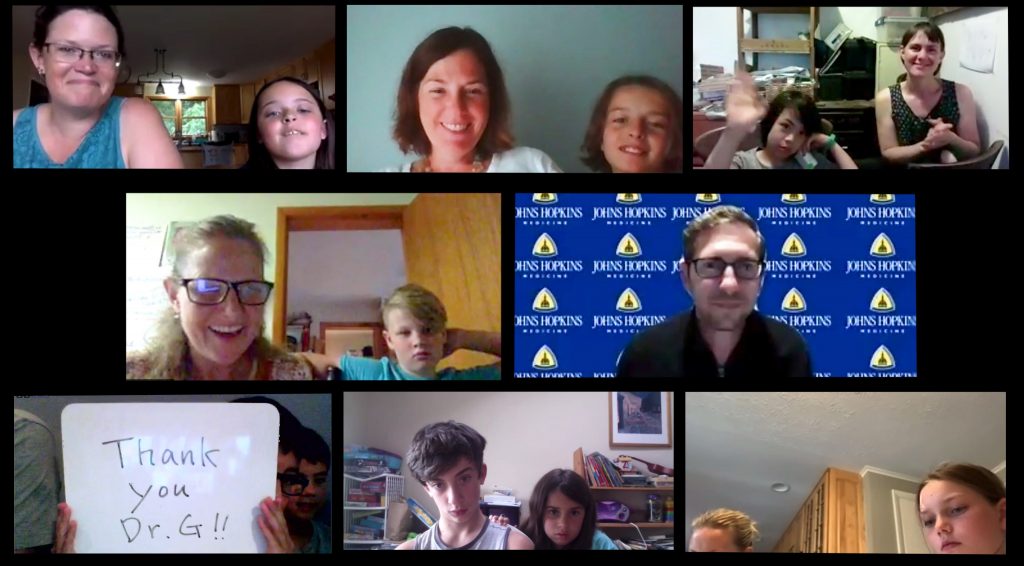They hadn’t been inside their school for months, but class was in session for a group of fourth graders from Trumansburg (N.Y.) Elementary on a Thursday night in late July. Seven students and their families joined their teacher, Susan Thomas, on a Zoom call with Panagis Galiatsatos, an assistant professor of medicine at Johns Hopkins. For an hour, the students learned about the coronavirus and how researchers at Hopkins and around the world are working to find treatments and a vaccine for COVID-19. The families had a chance to ask him questions, including whether and how schools should reopen, how to stay safe when schools do reopen, and whether it’s OK to spend time with their grandparents.
“I really didn’t know how this was going to go, because it’s summer,” Thomas says. “What surprised me most was the level of engagement from parents. I think people are really starved for factual information.”

The virtual visit came together after Thomas’ class made a $100 donation to Johns Hopkins’ COVID-19 response funds earlier this year. As the pandemic began, Thomas and her fiance, Eric Lind, found a large jar of coins in their home and chose to donate the funds. They created “Four for Fourth,” a program through which Trumansburg Elementary’s four fourth-grade classes would discuss the importance of philanthropy then each decide where to make a donation. Thomas’ class chose COVID-19 research.
“The first thing they said was that they wanted to give to the scientists because we have to stop [coronavirus],” recalls Thomas, who chose Johns Hopkins as the gift’s recipient after researching several COVID-19 response efforts. “We talked about the difference between treatment and research, and they said, ‘Please donate to the research — we understand people are sick now and need help, but we don’t want others to get sick.'”
Thomas says her students were deeply affected during the first several weeks of the pandemic, given their proximity to New York City’s outbreak and the state’s full lockdown. Having a chance to speak with a physician-scientist like Galiatsatos working directly to fight the pandemic was both informative and comforting for them.
“Dr. Galiatsatos was so approachable for these kids. He didn’t speak too far over their heads,” Thomas says. “I got such great feedback from the families — right away, three of them thanked me for setting this up and asked how they could learn more.”
Galiatsatos, who led a group of Hopkins Medicine staff to create a new coronavirus curriculum designed for school-aged children, emphasized that the students themselves could play a big role in helping bring COVID-19 under control — and speed their return to school and their friends.
“Your doctors and nurses really aren’t your front line, we’re your last line. We’re the last people to help. Who’s at the front line are the people who can physically distance, wear a face mask, and spread proper information about hygiene — so it’s you all,” Galiatsatos said on the call. “The more you guys stay informed, stay active, stay advocating, the more you’ll save lives.”
Topics: Friends of Johns Hopkins Medicine, Johns Hopkins Medicine, Promote and Protect Health